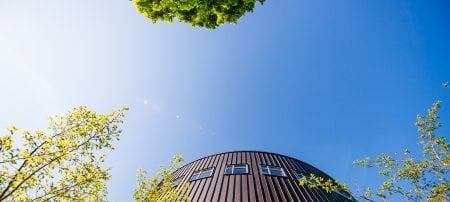Climate change is affecting the northwoods. In their guest blog, Kristen Schmitt and Todd Ontl lay out what the Northern Institute of Applied Climate Science is doing about it.
What will climate changes in the Midwest mean for ice fishing in Keweenaw Bay? How will increases in heavy rainfall affect our road networks? The Birkebeiner ski race in Wisconsin was cancelled this year – will this happen more often in the future? These were all topics that came up during a day of climate change discussion earlier this month, hosted by Michigan Tech School of Forest Resources and Environmental Science.
More than 35 people from Keweenaw and nearby communities attended a workshop designed to provide input for the Midwest regional chapter of the Fourth National Climate Assessment (NCA4). Workshop organizers wanted to hear from stakeholders about specific climate change concerns, information needs and ways of coping and adapting to change. NCA4 authors plan to use this feedback to help draft the report.
Home in the Northwoods
One thing that stakeholders made clear is that rural communities in the northwoods have distinct climate change needs when compared to urban or agriculture-dominated communities. An audience of scientists, Keweenaw Bay Indian Community (KBIC) members, foresters, academics, village managers, and representatives from non-profits engaged in lively discussions facilitated by members of the Northern Institute of Applied Climate Science.
Members of KBIC talked about traditional tribal practices that have already been affected by climate change—like the timing and length of the ice fishing season, wild rice harvesting and maple syruping. Many wanted to know how and if they would be able to continue these practices into the future. Some stakeholders wanted more information about what climate changes would mean for lake levels and water quality in the area. Others had dealt with the problem of trying to conduct winter logging and forestry operations with fewer days of frozen ground and more frequent weight restrictions on roads.
Climate Change Adaptation
In addition to hearing about regional concerns, NCA4 authors want to figure out how communities are adapting to climate changes, in order to share lessons with others. Adaptation here refers to any action that can be taken to help a system cope with the effects of climate change. There was no shortage of ideas! Examples ranged from moving and re-designing the campgrounds at McClain State Park to avoid beach erosion, to using new forest harvesting equipment that spreads weight more evenly over the ground and allows equipment to operate in wetter conditions. Local organizations like the Keweenaw Land Trust were also cited for their efforts to preserve large tracts of land, which may help species move more readily as the climate changes.
Looking at the larger picture, workshop participants recognized that being far north, the Keweenaw might be an inviting place for people and other species under future climates. What can we do now to create a place for plants and animals that might be pushed out of their habitats elsewhere? And what will an increase in people mean for the Keweenaw?
Real Impacts
Despite the potential for impacts to be less severe compared to other areas of the country, the northwoods are facing a number of impacts from a changing climate: warming winters, wetter springs and drier summers, and more intense storms that include extreme rainfall. As community members highlighted, these changes are being felt now and are impacting our communities, businesses and lives.
The observations and concerns of workshop participants are an important and necessary contribution to the Midwest regional chapter of NCA4, which will ultimately help us plan for adapting to climate change. The more we plan for these issues now, the better prepared we’ll be in future.
Michigan Technological University is an R1 public research university founded in 1885 in Houghton, and is home to nearly 7,500 students from more than 60 countries around the world. Consistently ranked among the best universities in the country for return on investment, Michigan's flagship technological university offers more than 185 undergraduate and graduate degree programs in science and technology, engineering, computing, forestry, business, health professions, humanities, mathematics, social sciences, and the arts. The rural campus is situated just miles from Lake Superior in Michigan's Upper Peninsula, offering year-round opportunities for outdoor adventure.








Comments